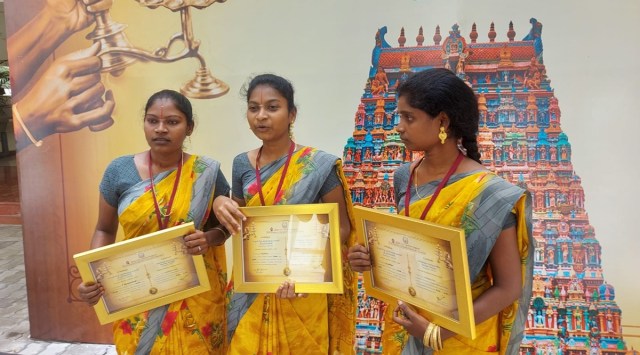‘New era of inclusivity’: In a first, TN trains three women to be temple priests
This heralds a “new era of inclusivity and equality”, said Chief Minister M K Stalin.
 S Ramya, S Krishnaveni and N Ranjitha will spend another year in prominent temples to hone their skills, following which they can be considered for appointment as priests.
S Ramya, S Krishnaveni and N Ranjitha will spend another year in prominent temples to hone their skills, following which they can be considered for appointment as priests. For the first time, the Tamil Nadu government has trained three women as temple priests at an Archakar Payirchi Palli – an institution for the training of priests.
This heralds a “new era of inclusivity and equality”, said Chief Minister M K Stalin. He said that even at a time when women were becoming pilots and astronauts, they were not allowed to become priests in many temples. “Because it was deemed impure, even in temples for female deities. But finally, change is here… Women are also now stepping into the sanctums, bringing a new era of inclusivity and equality,” he said.
S Ramya, S Krishnaveni, and N Ranjitha underwent training at the Archakar Payirchi Palli associated with the Sri Ranganatha Swamy Temple in Srirangam, near Tiruchirapalli. Such institutions for priests’ training were revived after the current DMK government came to power in 2021, resuming a programme that was initiated in 2007 by then chief minister M Karunanidhi.
The three women will go on to spend another year in prominent temples to further hone their skills, and after this, they can be considered for appointment as priests on the basis of merit.
பெண்கள் விமானத்தை இயக்கினாலும், விண்வெளிக்கே சென்று வந்தாலும் அவர்கள் நுழைய முடியாத இடங்களாகக் கோயில் கருவறைகள் இருந்தன. பெண் கடவுளர்களுக்கான கோயில்களிலும் இதுவே நிலையாக இருந்தது.
ஆனால், அந்நிலை இனி இல்லை! அனைத்துச் சாதியினரும் அர்ச்சகர் ஆகலாம் எனப் பெரியாரின் நெஞ்சில் தைத்த… https://t.co/U1JgDIoSxb
— M.K.Stalin (@mkstalin) September 14, 2023
Ramya, who has completed her MSc in Mathematics and had expected to take up a banking or teaching job, said she decided to join the programme after seeing a notification inviting women and individuals from all castes to train as priests.
“I was intrigued… When there are women in all jobs, I thought women should be able to do this, too. Also, I am not a stranger when it comes to temples, rituals and pujas,” she told The Indian Express.
“It was initially tough to learn the mantras,” she said, recalling the beginning of training in the historic town of Srirangam. She credited Sundar Bhattu, the archakar (priest) of Srirangam for teaching the trainees the intricacies of the rituals.
“It is worshipping God, but the process is precise and sharp. Like taking care of a child, from head to toe, we have to go through the process. We learned about the Pancharathnam Agama. It’s mainly in Tamil, though it contains some Sanskrit elements too,” she said.
Her grandfather and uncles were all familiar with conducting pujas for small functions in her village, she said, adding, “I have even attended ‘homams’ twice, including one for housewarming.”
Gearing up for another year of training before getting the chance to be officially appointed a priest, she said, “We have no fear of becoming women priests, and we hope this paves the way for more women to take up this sacred role. In our batch, there were 22 students, including three women. But in the latest batch that started just a month ago, there are 17 girls!”
Under the state’s scheme allowing people of all castes to become priests, a total of 94 people have been trained, including the three women. This breaks a historical precedent that barred women from becoming priests in many temples.
P K Sekarbabu, the minister for Hindu Religious and Charitable Endowments, said some temples in the state already had women priests and expressed hope that more women would join the priest training schools in the future. He said the government hoped to overcome any potential resistance to women becoming temple priests.
In June, the minister had said there were petitions from many women seeking permission to perform puja at temples.
Even as the idea of women priests are new to the temples that follow Agama principles in Tamil Nadu, the state has many subcultural deities – such as Sudalai Madan, Madurai Veeran, Karuppannaswami, Lord Pavadairayan or Kaaliyamma, Maariamma, Pechiyayi, Karuppai, and Chellathamma – that already have women priests leading rituals and running temples for several decades and even centuries.








